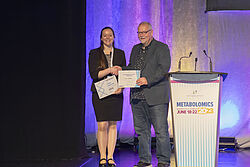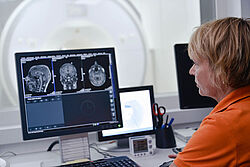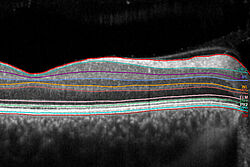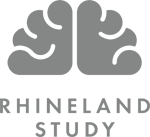News
07/26/2023 - Elvire Landstra wins Award of the Metabolomics Society

The 19th conference of the Metabolomics Society, an organization comprised of scientists worldwide that investigate the small molecules that make up humans, animals and plants, took place between June 18-22 in Canada this year. Here, Elvire Landstra, PhD student in the Rhineland Study, was awarded the prize for best Student presentation for her talk on lipids in relation to brain health.
All of us, naturally, want to age in a healthy manner and not get sick. However, some are more susceptible to disease than others. Going beyond their bad reputation, lipids may provide the key to understanding what keeps brains healthy across the lifespan. They are important not only as possible markers of disease, but also, critically, as important targets to prevent disease in the first place. Elvire Landstra’s research identified some key features of these lipids as important in health and disease in the general population.
04/10/2023 – Publication: Physical activity is associated with slower epigenetic ageing
Epigenetic aging – that is, age-related changes in the methylation patterns of DNA – is a sensitive marker of biological aging, which strongly contributes to both age-associated functional decline and development of a range of age-related diseases. Using cross-sectional data from more than 3,500 participants of the Rhineland Study, a team led by Ahmad Aziz, examined the association between physical activity and epigenetic aging, as well as the role of immune function and cardiovascular risk factors in mediating this relationship. They found that regular physical activity can slow epigenetic aging by improving immune function and reducing cardiovascular risk. Specifically, higher levels of physical activity were associated with slower epigenetic aging.
Publication: Physical activity is associated with slower epigenetic ageing—Findings from the Rhineland study. Fabienne A.U. Fox et al.; Aging Cell (2023). DOI: 10.1111/acel.13828
02/28/2023 – Publication: Visual impairment is associated with neurodegeneration in the retina and the brain
A team led by Dr. Dr. Ahmad Aziz analyzed visual acuity, retinal structures (measured with optical coherence tomography (OCT)) and brain and hippocampal degeneration (measured with magnetic resonance imaging) using data from more than 3,300 participants of the Rhineland Study in Bonn. Their results suggest a close association between visual impairment and degeneration of the retina and different brain structures, including the hippocampus, a brain region that plays a crucial role in memory formation. According to their findings, OCT-derived retinal measurements may be useful markers for neurodegeneration.
Publication: Visual impairment and retinal and brain neurodegeneration: A population-based study. Davide Garzone et al.; Human Brain Mapping (2023). DOI: 10.1002/hbm.26237
02/27/2023 – Publication: Adequate vitamin D levels are associated with greater grip strength across adult lifespan
Sufficient levels of 25-hydroxyvitamin D (25-OHD), the precursor to the biologically active form of Vitamin D, are important for optimal muscle function. The team, led by Dr. Dr. Ahmad Aziz, investigated the relationship between 25-OHD levels and muscle strength in more than 2,500 participants of the Bonn Rhineland Study, spanning most of the adult lifespan. They found that people with higher levels of 25-OHD had stronger muscles – but only up to a certain point, after which higher levels of 25-OHD had a negative effect on muscle strength. In older adults the effect of 25-OHD on muscle strength was weaker compared to the effect in younger adults. According to their findings published this month in the Journal Endocrine Connections, having enough vitamin D is important for strong muscles, but ingesting too much vitamin D might be harmful.
Publication: 25-hydroxyvitamin D level is associated with greater grip strength across adult lifespan – a population-based cohort study. Fabienne A.u. Fox et al.; Endocrine Connections (2023). DOI: 10.1530/EC-22-0501
02/08/2023 – Publication: Cardiovascular correlates of epigenetic ageing across the adult lifespan
Using data from the Rhineland Study, Dr. Dan Liu (first author) and colleagues investigated if differences in cardiovascular risk among people with the same chronological age are related to different rates of biological aging. They found that higher cardiovascular risk in multiple areas (including kidney function, body fat, and overall risk) was linked to faster biological aging. Most of the effects on biological aging were independent, suggesting that they may contribute to aging cumulatively. These cardiovascular risk factors may hence serve as targets for modifying the rate of biological ageing itself, with potential health impacts that go beyond the purely cardiovascular aspects of the ageing process.
Publication: Cardiovascular correlates of epigenetic aging across the adult lifespan: a population‑based study. Dan Liu et al.; GeroScience (2023). DOI: 10.1007/s11357-022-00714-0
01/01/2023 – Grant: Dr. Dianna de Vries gets grant from the Alzheimer Forschung Initiative e.V.

Is chronic stress a risk factor for Alzheimer's disease? This is the question Dr. Dianna de Vries would like to investigate as part of the research grant of the Alzheimer Forschung Initiative e.V.. The aim here is to better understand the association between perceived stress and brain health and to find out whether this is an indirect association through the activation of the immune system. Since there is currently no effective treatment for Alzheimer's disease, it is particularly important to address widespread modifiable risk factors.
Further information on the grant can be found here.
11/14/2022 – Monique Breteler is one of the most successful scientists in the world

Research.com, a leading academic platform for researchers, has published the 2022 edition of its ranking of the 1000 best female scientists in the world. The DZNE is very happy to have one of them in its ranks: Monique Breteler, Director of Population Health Sciences, is ranked 43rd worldwide and even 2nd in the national ranking for Germany!
Further information on criteria and ranking can be found here.
10/11/2022 – Rika Etteldorf wins DGEpi Master Prize

The 17th Annual Meeting of the German Society for Epidemiology (DGEpi) e.V. took place in Greifswald from 26th-29th September 2022. Rika Etteldorf, psychologist and doctoral student in the Rhineland Study, presented the results of her Master's thesis in a specially designated session "Master's students present" during the DGEpiannual meeting and was able to win the Master's Prize for outstanding Master's theses in epidemiology. In her Master's thesis, supervised by Prof. Dr. Ulrich Ettinger (University of Bonn) and Dr. Annabell Coors (DZNE), Rika Etteldorf investigated the correlations between brain structure and eye movements in the first 5,000 participants of the Rhineland Study.
08/03/2022 – Publication: The Brain Already Benefits from Moderate Physical Activity

Even moderate physical activity has a positive effect on the brain. DZNE researchers led by Dr. Dr. Ahmad Aziz deduce this from examinations of 2,550 participants of the Bonn Rhineland Study. According to their findings, certain areas of the brain are larger in physically active individuals than in those who are less active. In particular, brain regions that have a relatively high oxygen demand benefit from this effect.
Read the full press release
Publication: Association Between Accelerometer-Derived Physical Activity Measurements and Brain Structure: A Population-Based Cohort Study. Fabienne Fox et al.; Neurology (2022). DOI: 10.1212/WNL.0000000000200884
07/05/2022 – Prof. Monique Breteler and Prof. Tobias Böckers received membership certificates of the Leopoldina

On July 13, not less than two of our researchers were ceremoniously inducted as new members of the National Academy of Sciences Leopoldina: Prof. Monique Breteler, Director of Population Health Research and head of the Rhineland Study, and Prof. Tobias Böckers, group leader at the DZNE Ulm. This award honours their services to the neurosciences.
Read the full press release
06/30/2022 – Publication: More Brain Lesions in Senior Women than in Men of the Same Age

In women after menopause, the extent of certain brain lesions is larger than in men of the same age. DZNE researchers come to this conclusion based on the assessment of more than 3,400 adults as part of the Bonn Rhineland Study. A team led by neuroscientist Monique Breteler reports on the findings in Neurology, the medical journal of the American Academy of Neurology. The assessed tissue damages are considered potential risk factors for dementia and stroke. The current findings underline the significance of sex-specific medicine.
Read the full press release
Publication: Relation between sex, menopause, and white matter hyperintensities: the Rhineland Study. Valerie Lohner et al.; Neurology, the medical journal of the American Academy of Neurology (2022). DOI: 10.1212/WNL.0000000000200782
03/15/2022 – Publication: The Retina as a Potential Biomarker for Reduced Brain Matter

Researchers from the Department of Ophthalmology at the University Hospital Bonn (UKB) and Deutsches Zentrum für Neurodegenerative Erkrankungen (DZNE) have found a close connection between the dimensions of retinal structures and those of the brain. Their study results suggest that assessments of the eye’s retina could help to detect a loss of brain substance, i. e. “brain atrophy”. The findings are based on data from the so-called Rhineland Study.
Read the full press release
Publication: Retinal layer assessments as potential biomarkers for brain atrophy in the Rhineland Study. Matthias M. Mauschitz et al.; Scientific Reports (2022). DOI: 10.1038/s41598-022-06821-4


